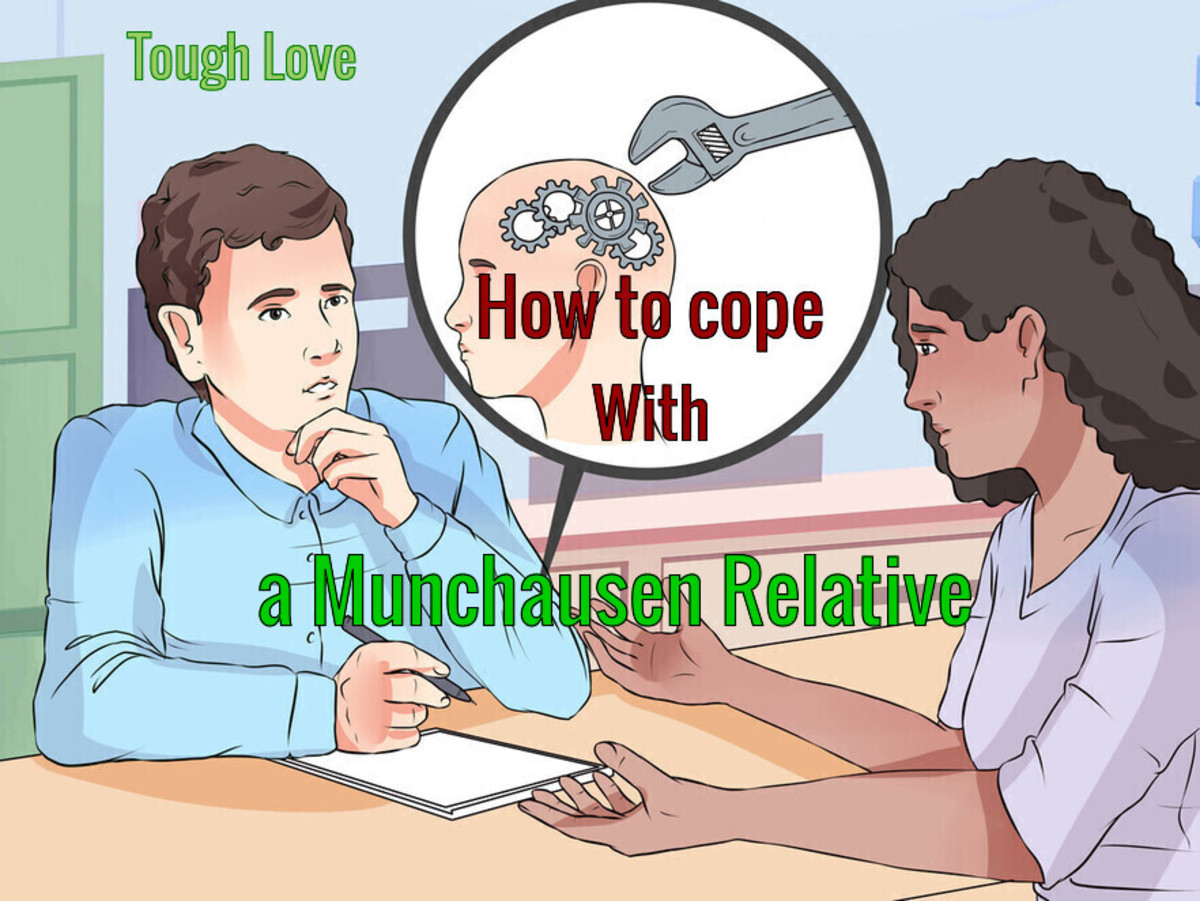MENTAL HEALTH SERIES, PART 4
BIPOLAR DISORDER IN KIDS
This is the fourth blog in the Mental Health Series. These blogs correspond to six foster parent training classes that I am facilitating at San Bernardino Valley College on Tuesday and Friday mornings from 9 a. m. to Noon, starting September 28 and concluding on October 15, 2010. If you live nearby and want to attend the classes, email me.
What Does Mental Health Look Like? was the topic of the first class. http://hubpages.com/hub/MENTAL-HEALTH-SERIES-PART-1
Responding To Depression In Foster Children was the topic of the second class. http://hubpages.com/hub/MENTAL-H-EALTH-SERIES-PART-2
Soothng The Anxious Child was the topic of the third class. http://hubpages.com/hub/MENTAL-HEALTH-SERIES-PART-3
Today we are going to discuss the diagnosis of Bipolar disorder, learn to recognize some of the outstanding symptoms, and learn ways to talk to children and teens who have been diagnosed with Bipolar disorder. Notice I did not say HAVE bipolar disorder, but diagnosed with.
You have a very brief but informative article on bipolar disorder in kids. It is the perfect article for our purposes here this morning.
http://www.webmd.com/parenting/features/bipolar-disorders-kids
Try to remember that only about 1% of the children in the U. S., are diagnosed with bipolar, so it is not that common even though it appears to be one of the "garbage" diagnosis of the day similar to ADD or ADHD. There is always the possibility that symptoms for bipolar disorder may also be symptoms for another more suitable diagnosis.
A common thread running through the symptoms of the bipolar diagnosis is EXTREME and EXCESSIVE. Extreme and "severe changes in mood....Unrealistic highs in self esteem....frequent sadness or crying....excessive guilt....frequent physical complaints....." (Citation from the webmed article.)
So the bottom line question is what else might bring about similar symptoms? Well, trauma for one, and loss and grief for another. It is obviously important to have an accurate diagnosis so that the best treatment available can be provided. My biggest concern with the bipolar diagnosis is we begin to treat bipolar and not the trauma and the grief. For example, medication can be very helpful in stabilizing one’s mood swings, but what if one witnessed their father killing their mother or vice versa? Maybe that person needs to experience extreme mood swings throughout the grieving process. You cannot grieve on an even keel especially when the loss includes a heinous trauma.
REGULATION
Perhaps a concept that could be applicable to all foster children and teens, regardless of their diagnosis, is that they need regulation of their environment, their bodies, their minds, and their souls.
By regulation, I mean they need sufficient or enough of many life essentials. They need for the chaos in their lives to be kept to a minimum. They need to live in a predictable and somewhat scheduled routine, so going to bed at a certain time, getting up at a certain time, eating meals at a certain time, and so on. They need to have sufficient time and affection from the big people in their lives so they can experience being loved even if they cannot take it in. When they are falling apart and tantruming, no matter what age, they need calm big people to surround them and scoop them up, so to speak, and gently put the pieces back together. They need a certain number of hours of sleep each night. They need sufficient amount of food and nutrients and vitamins on a daily basis, sufficient fluid, especially water, just like we all do. They need big people to coach them kindly when they are moving into extremes, whether it be extreme melancholy or extreme silliness. Note, they need coaching, not discipline or punishment. They need sufficient space and time to cry and cry a lot without someone implying that they have cried enough or that they are a cry baby. Knock it off macho s**theads!
REPERTOIRE OF SKILLS ABSENT
Often times, when an adult is diagnosed with bipolar, they may have had the opportunity to have lived a somewhat normal life for a period of time, especially during their growing up years. They may have years of experience in developing social skills, frustration tolerance, inhibition skills, and the like to fall back on during depressive or manic episodes. Children and teens diagnosed with bipolar do not have such a repertoire. So again, our job is to be the good and patient coach, not a drill instructor, prison guard, or executioner.
BIG PEOPLE WHO CAN TALK ABOUT TRAUMA
All foster children, regardless of diagnosis, deserve big people who are willing and capable of talking about their traumas without denying the trauma, minimizing the trauma, or giving the old let’s move on and not get stuck here pep talk.
I was working with a young man in his early thirties, who is what I call a contemporary warrior. He works in a high risk industry where he witnesses horrific accidents and death on a daily basis. He has become quite skilled at splitting off while on scene. The only problem is he does not know how to get back to being connected again to his emotions. I told him it would be worthwhile for him to experiment with staying connected while responding to a horrific accident. I suggested he do this by focusing on his breathing and intentionally not disconnect and go into survival mode. I suggested that perhaps the accident victims would recognize and welcome his compassion as will his teammates. I told him that the end result would be the same. The victims would receive top notch emergency care, and at the same time experience being cared for by another human being instead of a robot who just might slip with a dark remark just to keep everyone from having to feel what they are feeling. and then have to stop at a bar after shift to get sh-t faced.
I asked this young man to make a list of all the awful events in his life. He made the list, and conveniently left it on his desk, so he didn’t have it in session with him. So I asked him what he had on the list. The first thing he told me was about his best friend when he was eleven years old who died while the client was on a summer visit to his Dad’s. What a shock to return from a summer visit with Dad to find out your best friend had died weeks before. He told me that he really didn’t think the event had impacted his life in any way, but he put it on the list as I had requested.
So relentless me, I asked him to tell me about his friend, Jerry. Suddenly, his face turned beat red and puffy. The tears rolled down his cheeks. He was trying desperately to hold on. I told him to breathe. I told him "it is all right, really...He was your best friend. And you didn’t get to say good bye or anything." I reminded him that the pain of this loss was as intense at this very moment as it was over twenty years earlier. I suggested he write Jerry a letter and even send it. Drop it in a mailbox and let the post office figure out what to do with it. I told him he might want to send several letters. I also suggested that he talk to Jerry and ask Jerry to let him know somehow that he watches out for him.
To some of you, those suggestions might sound crazy. But why? Why do they sound crazy to you? Because you didn’t get the chance to say good bye however many times? Because you learned how to suck it up and be disconnected? Are you are too scared or too embarrassed to let a dead loved one know that you still need them? Admitting that will hurt way too much. Right?
So how in the heck are we going to support one of these foster children dealing with their traumas and losses? And if there is no one there to support them, of course, they are going to go nuts, maybe even bipolar!
Today, I will provide sufficient time for you to present to the class specific children who have these extreme symptoms, and as a group, we will brainstorm and provide you with support. If you are reading this blog and wish to email me a situation you are dealing with, please feel free to do so. Include as much detail as possible and I will respond. You can even leave your "case" in the comment section below.
Recently, I was in a session with a Mom and Dad and their fifteen year old son, who is diagnosed bipolar, and perhaps accurately. This young man was as angry as I have ever experienced a person being angry in my entire practice. It scared me. I did not know what to do. He was calling his parents every conceivable awful four letter combination of names in the history of spoken language.
He was out of control. So it was up to us to provide control and regulation. I sat very calmly. Although I was not calm, so I had to breathe for what seemed like forever to take myself to a place of calmness. When I got there, I said, "You are really really angry. You are really really angry. You are so angry, it scares me. What is going on?....I don’t know what I am supposed to do here for you." I made these statements not in a wavery scared tone, but from a place of groundedness and confidence. I spoke clearly and calmly and with a certain authoritativeness, speaking my truth, and probably the truth of his parents. What happened? He instantly calmed down.
I am not naive enough to think this will "work" every time in every situation, but it can work most of the time, if I work at it for myself. If I practice staying calm. If I practice saying the words ahead of time, so in the situation, the words are there for me. So let’s take a look at some scripts that will address the need for regulation, the reality that the child or teen is out of regulation, sentences that will acknowledge that something is going on inside rather than "you’re being disrespectful, defiant, manipulative, cruel, hateful, mean, and so on.
SCRIPTS
SEVERE CHANGES IN MOOD
"Whoa, you’re scaring me (but not scared in your tone). A second ago, you were really happy and now you are just furious. What is going on?"
"Here, take my hand. Let’s breathe together. Let’s get something to drink. How about one of those cookies?"
UNREALISTIC SELF ESTEEM
"You must be feeling like superman! Do you ever get just a little bit nervous? No? Wow, I would."
"So what’s it feel like to be indestructible?"
SLEEPLESS
"I notice you’re not getting much sleep lately. Let’s talk about that. We all need our sleep around here, and you are going to feel a lot better if we can find a way to help you go to sleep. Maybe I can sit with you tonight until you actually fall asleep. You know, sometimes, when we’ve been through really scary stuff, it’s get really difficult to fall asleep."
MULTIPLE PROJECTS
"Wow, you can sure juggle. Hey, let’s take a walk. Walk with me for a few minutes and just talk. Tell me what’s going on. You’re really all over the place. What’s happening?....You know sometimes I wonder if you were just to stay focused on one thing, do you think you might start thinking about all that awful stuff you went through?"
TALKING
"You’re a chatter box today. Do you know that? Can you hear yourself? I get like that sometimes, talking a mile a minute. Do you ever notice that about me? Tell ya what, you let me remind you when you get like this and you can remind me. Take a deep breath, dude. And you know, you got a lot of cool things to say."
SADNESS OR CRYING
So what’s coming up for you? You know it’s good to cry. You want to take a walk and talk? Maybe we could hit Starbucks.....You know, I know, you have a lot of tears in there, and a lot to cry about, believe me. It’s okay."
WITHDRAWAL
"Wow, where’d you go? Seems like you went away somewhere for a couple of days. Sorry I didn’t notice sooner. Will you let me know next time you start to go away? Cause maybe you need to get away, and I can help you with that, just not stay away for as long."
LACK OF ENTHUSIASM
"Boy, you’re really struggling. You know, sometimes, I just can’t make myself even begin to do all that I am supposed to do in a given day. Looks like you’re right there today. Let’s talk about it. You ever see me when I’m like that? Want to tell me the next time you see that in me?"
WORTHLESS AND EXCESSIVE GUILT
"Hey, you look guilty of something. So tell me, what’s going on inside?
"You look like I look when I’m feeling worthless and hopeless. What’s going on? Do you ever remember seeing me look the way you do now? I do, you know. Want to know what I do? No? Well, I’m gonna tell ya anyhow!!"
SENSITIVITY TO REJECTION AND FAILURE
"It really hurts, doesn’t it? I watched you put so much effort into that project....I hate it myself when I fail....or my best friends tell me they don’t like me anymore......"
"Hey, I want you to look at me, right here, face to face. I love you, kiddo, and you’re okay, you are really okay, don’t forget that, and don’t let anyone ever ever ever tell you differently."
HABITS
"So what’s up with the gobbling? You’ve been eating like a turkey or ostrich. Man, you know, I get like that everyonce in a while. It happens to me when I get these really weird feelings in my body, and I think I am going to go a little nuts, and it just seems like sleeping/eating will make them go away. Sometimes when I overeat, I feel really full for awhile, but then the worry comes back....or when I just want to sleep, and sometimes it works, but sometimes it doesn’t. If you want to sleep, I’ll sit here with you while you sleep and read a book......"
PHYSICAL COMPLAINTS
"Seems like your whole body just hurts these days...you know, sometimes when we’ve been through really really awful stuff, like you have, we don’t know what to do with the awful stuff, so we just tuck it inside our bodies and it comes out in all of these aches and pains....".
THOUGHTS OF DEATH, SUICIDE, SELF DESTRUCTIVE...
"It’S weird how we get these thoughts sometimes.....it won’t scare me for you to talk about them. You know, you have already seen a lot of people die, so it makes sense to me that you think about it a lot....and I want you to know, I like you just the way you are–ALIVE. And let me see those arms. Let me put some cream on those scratches and cuts.....You know when we are in as much pain as you are in, sometimes we do just want to die, and that’s when we need good people in our lives to let us know it is worth going on living."
SUMMARY
So work at these scripts and conversations. Remember, the content of the conversation is you providing regulation. Statements that encourage regulation. No lecture, no drill instructor, no punishment. REGULATION. And one of the biggest regulators you use is your heart and the relationship you establish with the children and teens.
So now, present any situations you have that are difficult to deal with, and together we will brainstorm and provide you with some tips and some more conversation to have with the child you are struggling with. The point here is not what will "work" to stop the behavior. But what will work to establish a relationship and make the child feel regulated and safe.
THANKS EVERYONE FOR PARTICIPATING.









